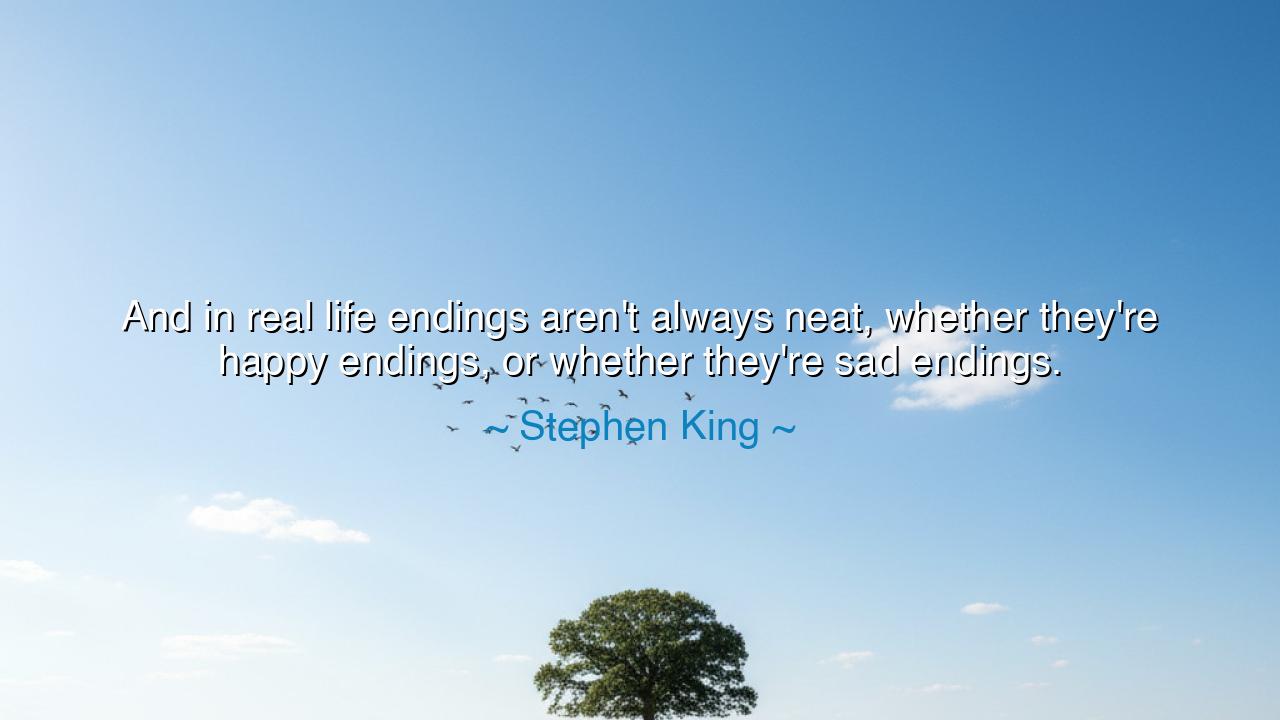
And in real life endings aren't always neat, whether they're
And in real life endings aren't always neat, whether they're happy endings, or whether they're sad endings.






The words of Stephen King, “And in real life endings aren’t always neat, whether they’re happy endings, or whether they’re sad endings,” carry the bittersweet tone of a man who has seen deeply into the nature of stories and souls. Beneath the surface of his reflection lies an eternal truth: that life is not a tale that closes cleanly, and the human heart is rarely granted the satisfaction of perfect closure. King, the master of storytelling, reminds us that beyond the pages of fiction — beyond the curtain of our dreams — real life flows onward in a messy, beautiful, unfinished way. The endings we long for seldom arrive as we imagine them, and yet it is in their imperfection that the truest meaning of living is found.
In ancient times, philosophers and poets alike wrestled with this same mystery. Homer’s Odyssey, though it ends with Odysseus reunited with his beloved Penelope, is shadowed by the cost of his long journey — the comrades lost, the years wasted, the scars that time cannot heal. Even in triumph, there is sorrow; even in peace, a whisper of what was broken. The ancients understood that life’s endings are never clean cuts, but woven threads, tangled with joy and pain, gain and loss. King’s words are the modern echo of that ancient wisdom — a reminder that our stories are written in the ink of imperfection.
There is an honesty in this acceptance of untidiness. To crave a neat ending is to crave control — to believe that life will answer our pain with symmetry, our effort with justice. But existence is not bound by the laws of narrative. A love story may end in silence, not betrayal; a dream may fade quietly instead of collapsing in tragedy. The truth of reality, as King tells us, is that closure is a myth of comfort, not a law of nature. Those who seek meaning in chaos must learn to love the unfinished symphony — the grace of things unresolved.
Consider the life of Vincent van Gogh, whose art blazed with color but whose days were filled with anguish. In the world’s eyes, his life ended in failure — madness, poverty, death. Yet time revealed a deeper ending: his work would change how humanity saw color, emotion, and soul. His story shows that no ending is final, for life continues to speak even after the curtain falls. What looks like tragedy in one age may be triumph in another; what feels like loss today may ripen into understanding tomorrow. The universe itself, vast and eternal, does not close its chapters neatly — it expands, it evolves, it remembers.
To understand King’s wisdom is to accept that human beings are not authors of destiny, but participants in a larger, living story. The endings of our loves, our labors, our dreams — they are not punctuation marks, but transitions. Death, heartbreak, success, forgiveness — these are not full stops but commas in an ever-flowing sentence written by time and chance. The ancients would have said: “Do not weep for what has ended, for it has simply changed form.” The seed becomes the flower, the fire becomes the ash, the silence becomes the song of memory.
There is courage in this acceptance. To face an unclean ending — a goodbye without closure, a dream left incomplete — is to walk the same road as every soul that ever lived. Life’s beauty is inseparable from its disorder, its light from its shadow. The wise do not demand that the world make sense before they love it; they love it despite its chaos. They understand that the heart grows not through perfection, but through endurance. To embrace the mess is to embrace life itself — raw, unpredictable, magnificent.
The lesson is timeless: do not wait for life to resolve before you live it. Do not waste your strength trying to rewrite what is beyond your pen. Instead, live fiercely in the middle of your unfinished story. Cherish what was good, forgive what was broken, and carry forward with faith that even the untidiest ending has meaning in the greater pattern of existence. For in the eyes of eternity, every story — whether happy or sad — is beautiful, because it was lived with heart. And that, as Stephen King reminds us, is the only ending that truly matters.






AAdministratorAdministrator
Welcome, honored guests. Please leave a comment, we will respond soon